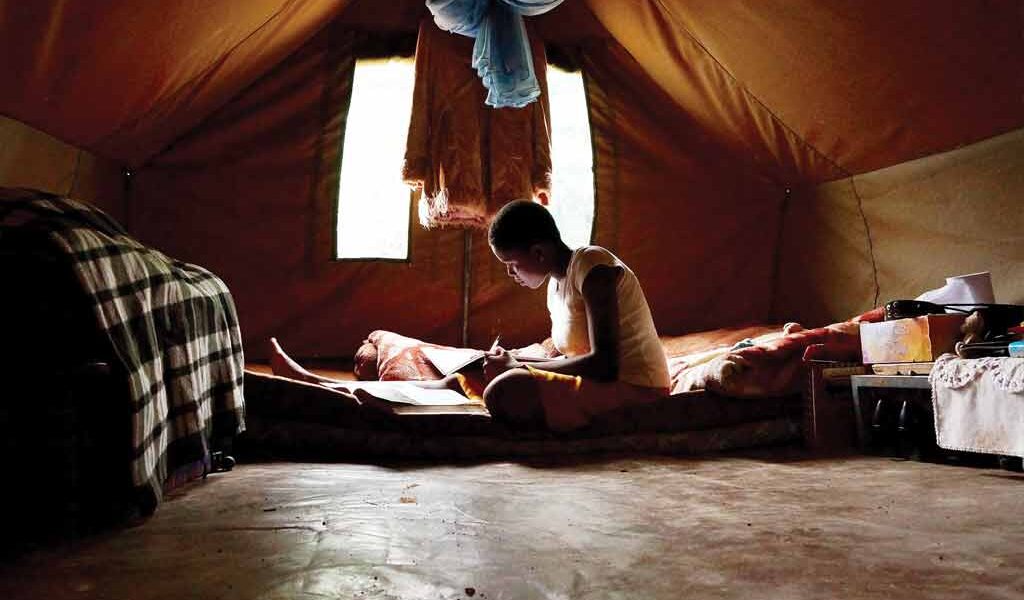Namibians,Rwandans and Zimbabweans no longer refugees
Govt intensifies talks with other countries
TEFO PHEAGE
The Botswana government is committed to empty and if successful close down the Dukwi refugee camp which of late has been attracting negative publicity for the country.
Once a home to around 3000 refugees,the camp currently has about 900 refugees following the departure of Namibian, Zimbabwean and Rwandan refugees. The camp currently hosts Eritrean, Somalia and Democratic Republic of Congo refugees all whose countries are still in dire situations.
The Permanent Secretary in the Ministry of Defence Justice and Security, Segakweng Tsiane told this publication in an interview that their anticipation is that those who are still resisting will eventually go because they are no longer refugees, “we know longer have what we call Namibian, Zimbabwean and Rwandan refugees. Those who are from these countries and still in Botswana should atleast be refered to as Dukwi residents because their refugee status has long ceased,” she said.
Tsiane said the country currently stands at around 900 refugees whose countries are still in undesirable political situations, citing DRC, Eritrea and Somalia. Fewer refugees means that Botswana’s economic expenditure on the refugees is drastically reduced.
In 2016, the United Nations High Commission for Refugees (UNHCR) announced that they will officially shut down their operations in Botswana because the country ‘s refugee population has drastically reduced and that the capacity of government to independently contain refugees has grown.
The government did not take kindly to this backtracking by the refugee agency in what later turned into a backstage quarrel between the two parties.
The case of those who remain behind…
Somalia
Civilians in Somalia, enduring abuses by all warring parties and dire humanitarian conditions, continue to bear the brunt of the country’s long-running conflict.
Targeted attacks on civilians and civilian infrastructure, particularly by the Islamist armed group Al-Shabab, with suicide bombings and improvised explosive devices (IEDs), continue to have a devastating impact. United Nations reports that over 1 million Somalis remain internally displaced, facing serious abuses and very limited access to basic services.
DRC…
Many continue to witness a worsening humanitarian situation in DRC owing to the president, Joseph Kabila ‘s persistent delay to hold elections.
In February Botswana government launched a scathing attack on Kabila blaming him for the situation in his country. ““We continue to witness a worsening humanitarian situation in that country mainly because its leader has persistently delayed the holding of elections, and has lost control over the security of his country,” Botswana’s Ministry of International Affairs said in a statement.
The current political impasse in DRC has led to a crisis that has exacerbated violence and forced millions to flee their homes. Inter-ethnic clashes over the past two days in eastern Congo’s North Kivu province, it reportedly killed more than 22 people, including over a dozen civilians. In 2003 the country emerged from a five-year war that killed millions, mostly from hunger and disease.
Kabila’s refusal to vacate office and his repeated delaying of elections has resulted in the politically powerful Catholic Church organising protests which have led to bloody clashes between security forces and protesters, including those over the weekend and on Monday that left several protesters dead.
Eritrea…
In 2015, ten Eritrean players who had come into Botswana for a football match shocked many when they declined to go back home after the match citing their countries as uninhabitable and unsafe. They were granted asylum and eventually the refugee status by the Botswana government following court battles.
In Eritrea the President Isaias Afwerki rules without institutional restraint. No national elections have been held since self-rule in 1991. Eritrea has had no legislature since 2002. The Human Rights Watch reports that the judiciary is subject to executive control and interference. A constitution adopted in 1997 remains unimplemented. Public space to question government policy does not exist. No domestic non-governmental organizations are permitted.
The government owns all media. In September 2001, the government closed all independent newspapers and arrested its leading journalists. After 25 years of rule by unelected President Isaias, Eritrea’s citizens remain subjects of one of the world’s most oppressive governments.
In May 2016, the Human Rights Watch says a United Nations Commission of Inquiry (CoI) established by the Human Rights Council in its final report said it found reasonable grounds to believe the government has committed numerous crimes against humanity.

